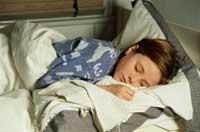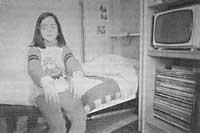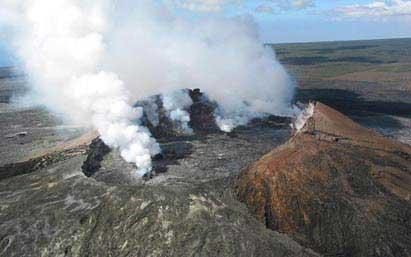Sleep without wasting time
2001/08/19 Mendiburu, Joana - Elhuyar Zientziaren Komunikazioa

Sleeping is not like giving the switch off. When we sleep, mental activity does not stop and, in some cases, when we dream, for example, much energy is consumed. Researchers define sleep as: "The relative lack of consciousness and voluntary muscle movement is already a physiological state."The definition is inaccurate, but what is clear is that sleeping is not resting. Sleep is an active state in which complex physiological processes occur. It involves several parts of the brain and depends heavily on the biological clock (to another extent, the clock that tells us that every morning is time to go to work).
According to Ana Bes, an expert at the Dexeux University Institute in Barcelona, sleeping is the activity we do most in life and it is important to carry out new research in this field. Sleeping badly has two levels of consequences: personal and socioeconomic. The discomfort caused by little or bad sleep and the tendency to be distracted leaves economic losses. In Spain, the direct loss of money amounts to 400 billion pesetas and the indirect cost amounts to 6 billion pesetas.
Why do we sleep?
To know why we sleep, there have been several theories. Over time, although some have been discarded and others have not yet been tested, they seem to be on the right track.
An old theory, quite simple, said that at night he sleeps because there is nothing to do. More than one young man will say (and rightly so) that this is false, but without limiting himself to the dormant aspects of the human being, seen from a broader perspective, could make sense. However, over time, that is not so.
Another theory said that, being asleep silent and almost immobile, sleep was a defensive mechanism. That's totally wrong, because we don't realize the danger of the predator during sleep.

According to the most reasonable theories, when sleeping we consume (or generate) some accumulated (or spent) substance during the day. It has not yet been demonstrated, but this argument is not rejected. Other theories argue that sleep is directly related to memory and learning, so children and young people sleep more. In addition, it is true that learning at dusk is good because it helps to learn the REM phases of sleep. However, this theory is yet to be demonstrated.
Varies with age and habits
Sleep hours and sleep itself change with age. A newborn, for example, sleeps 18 hours and also has many small sleep/awake cycles. Over time cycles and hours of sleep are reduced. Teens sleep about 9 hours and adults 7.5 hours. Over the years, in old age sleep loses effectiveness and it is enough to sleep 6.5 hours. In addition, sleep habits change and as you age you prefer to lie down earlier.
However, do not think or want to sleep 8 hours a day. This is the most common, but there are those who have to sleep 6 hours and others who need more than 9 hours. After all, the next day best reflects whether you have fallen asleep enough or not.
They currently use cutting-edge materials to know whether a person's dream is appropriate or not. However, in the first place, it is necessary to know the habits of the person; the medical history, habits related to sleep (how many hours sleep, when you lie down, if there are changes of rhythm...), if you take medicines, if there are allergies or any other factor that alters the respiratory rhythm, if there is infection or pain...
Once this is known, electrodes are used to conduct thorough research. It measures eye movement, brain and muscle activity and heart rhythm.
Phases of sleep

Sleep is divided into five phases. The first phase is the time it takes for the body to adapt before bed. Normally this phase usually lasts about 10 minutes, that is, only 5% of the time the sleep lasts. In this phase the body relaxes, breathing becomes uniform and brain activity decreases.
The second phase is the transition phase. This phase spans a long time, about 50% of sleep. Phases 3-4 are similar and the duration is 60-70 minutes. In these phases strong tactile or acoustic stimuli are needed to wake up.
The final phase is the so-called REM (Rapid Eye Movement). We always dream in the REM phases, but we only remember that we were dreaming when we are in the REM phase.
Phase 1, 2, 3-4 and REM follow ups are cycles of 90 to 100 minutes. These cycles are repeated 4 to 5 times in sleep hours; although we have the feeling of having slept 8 hours in a row, we always wake up 6 to 8 times. These awakenings are usually very short (less than 30 seconds) and may not be aware of it. However, cycles are not always complete. In the first half of the night we sleep more deeply and in the second half the REM and 2 phases are more frequent.
For reasons of responsibility, you do not always sleep less or more when the need for sleep is high. More than duration the phases of sleep change. After a spree, for example, there is no phase 1.
Less bad than when reading sleep theory and incidents you have not fallen asleep, and that others, on the contrary, you will have good dreams.
Daily sleep hours of mammals
Jirafa2Elefantea3Balea\\{\}Human 7.5 Cat 12,5Arrato13Lion 13,5BatPublished in 7K

Gai honi buruzko eduki gehiago
Elhuyarrek garatutako teknologia






